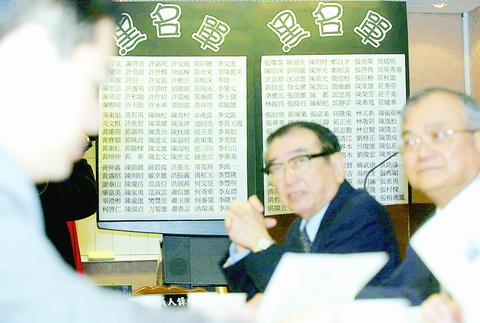Former political dissidents blacklisted by Taiwan's authorities when the country was under martial law joined lawmakers yesterday to urge the government to disclose files pertaining to the formation of the persona non grata policy in Taiwan's history.
The policy which mainly targeted supporters of Taiwan independence, was formulated during the martial law period. Those Taiwanese labeled by the policy were forbidden from returning to their homeland.

PHOTO: CHIANG YING-YING, TAIPEI TIMES
"The government should bring these files into the light to allow victims of the blacklist to enjoy the right to go over these files about themselves," said DPP lawmaker Hsiao Bi-khim (
"They have every right to clearly understand why they were accused by the authorities and how they were monitored," Hsiao said.
Dozens of victims of the policy, voiced similar yearnings.
"I hope that investigations into the formulation of the blacklist in the past under the KMT-led government can allow us to understand the truth," said Lo Yi-shih (
Organizers of the hearing also released countless names blacklisted by the KMT government in the past, many of which have turned the table to emerge as key players in the ruling DPP government.
Lo Fu-chen (
Lee Ying-yuan (
In 1990 Lee returned to Taiwan through illegal channels as part of WUFI's plan to move its headquarters back to Taiwan, and began a 14-month hide-and-seek game with intelligence agents before he was arrested on charges of sedition.
Former dissidents at the public hearing also targeted incumbent Taipei city mayor Ma Ying-jeou (
"Although he has denied taking photos of demonstrators in a street protest back in 1978, I witnessed it myself," said Chang Chi-tien (
Chang at the time was pursuing his degree in medicine, while Ma was studying law in Harvard.
Ma has always denied any accusation about to his alleged role as a KMT spy during his studies overseas.
Campaigners for opening records of the blacklist believe that the proof of his involvement, in the guise of written reports, lies in the files.

MAKING WAVES: China’s maritime militia could become a nontraditional threat in war, clogging up shipping lanes to prevent US or Japanese intervention, a report said About 1,900 Chinese ships flying flags of convenience and fishing vessels that participated in China’s military exercises around Taiwan last month and in January have been listed for monitoring, Coast Guard Administration (CGA) Deputy Director-General Hsieh Ching-chin (謝慶欽) said yesterday. Following amendments to the Commercial Port Act (商港法) and the Law of Ships (船舶法) last month, the CGA can designate possible berthing areas or deny ports of call for vessels suspected of loitering around areas where undersea cables can be accessed, Oceans Affairs Council Minister Kuan Bi-ling (管碧玲) said. The list of suspected ships, originally 300, had risen to about 1,900 as

DAREDEVIL: Honnold said it had always been a dream of his to climb Taipei 101, while a Netflix producer said the skyscraper was ‘a real icon of this country’ US climber Alex Honnold yesterday took on Taiwan’s tallest building, becoming the first person to scale Taipei 101 without a rope, harness or safety net. Hundreds of spectators gathered at the base of the 101-story skyscraper to watch Honnold, 40, embark on his daredevil feat, which was also broadcast live on Netflix. Dressed in a red T-shirt and yellow custom-made climbing shoes, Honnold swiftly moved up the southeast face of the glass and steel building. At one point, he stepped onto a platform midway up to wave down at fans and onlookers who were taking photos. People watching from inside

Japan’s strategic alliance with the US would collapse if Tokyo were to turn away from a conflict in Taiwan, Japanese Prime Minister Sanae Takaichi said yesterday, but distanced herself from previous comments that suggested a possible military response in such an event. Takaichi expressed her latest views on a nationally broadcast TV program late on Monday, where an opposition party leader criticized her for igniting tensions with China with the earlier remarks. Ties between Japan and China have sunk to the worst level in years after Takaichi said in November that a hypothetical Chinese attack on Taiwan could bring about a Japanese

The WHO ignored early COVID-19 warnings from Taiwan, US Deputy Secretary of Health and Human Services Jim O’Neill said on Friday, as part of justification for Washington withdrawing from the global health body. US Secretary of State Marco Rubio on Thursday said that the US was pulling out of the UN agency, as it failed to fulfill its responsibilities during the COVID-19 pandemic. The WHO “ignored early COVID warnings from Taiwan in 2019 by pretending Taiwan did not exist, O’Neill wrote on X on Friday, Taiwan time. “It ignored rigorous science and promoted lockdowns.” The US will “continue international coordination on infectious